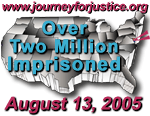 More on Choosing
a Public Meeting Place More on Choosing
a Public Meeting Place
If you want to call a public meeting, most cities have rooms
or auditoriums in libraries, schools or community centers. Government
buildings are usually free and you can call the "facilities
management" office of the city or county government, or
the mayor's office for information about rooms and auditoriums
for public use.
Universities have excellent facilities, including auditoriums
that students and faculty members can often use free of charge.
Other nonprofit groups or churches will sometimes rent facilities
at a reasonable rate. Hotels also have meeting rooms for rent.
Search a school's website for a student organization that
might like to co-sponsor a Journey for Justice public meeting
with you. Find a faculty member with interest in the issue. Criminal
justice and chemical dependency professors are obvious people
you might contact. Educational institutions often have excellent
facilities.
To use a civic building or school, you will have to fill out
paperwork. Very Important! An approved application or permit
should be in hand before you begin to publicize the event. It
could take several weeks to get an application approved, especially
if it has to be submitted to and approved by a council or governing
body. If you are denied a permit, politely ask exactly why. Appeal
any unsupported denial immediately to higher authorities.
You will want to inspect the facility you plan to use. It
should be clean, large enough to hold the audience you expect
to attract -- not empty. I's better to err on the side of not
having enough space as opposed to an empty looking large room.
Is it accessible to the handicapped with good parking, and in
a convenient area where people you have invited can move with
ease?
You will need to publish exact driving directions, and depending
on your area, driving directions from a multitude of directions.
You must also know bus routes and any other mass transit instructions.
All of this information can be posted on the website. General,
but good instructions, should be published on any flyers and
for the newspaper event listings.

|









